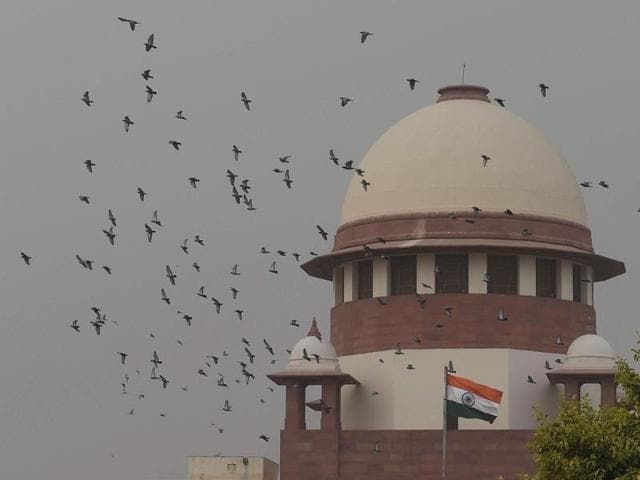Judicial calibration of policies is unwise
The judiciary must recognise that there are inherent limitations to the exercise of its powers when it comes to policy questions.
The recent observations of finance minister Arun Jaitley about the role of the judiciary in adjudicating upon a number of policy matters has sharpened the debate over separation of powers and constitutional obligations of the judiciary as a counter majoritarian institution. The minister observed that “judicial review is the legitimate domain of the judiciary but then a Lakshmanrekha has to be drawn by all the institutions themselves. Lakshmanrekha is very vital”. He added: “Executive decisions are to be taken by the executive and not the judiciary”. These are important observations and reflect the collective concerns not only of the government, but also of other institutions of democracy.

I believe the judiciary will not disagree with the separation of powers principle articulated by Jaitley. The real difficulty is in relation to where the Lakshmanrekha should be drawn. Historically, the judiciary has been progressive and inclusive in interpreting the provisions of the Constitution to uphold justice. The evolution of public interest litigation, liberal and progressive interpretation of rules, expansive interpretation of fundamental rights and directive principles of state policy, invoking the writ of continuing mandamus, recognition of substantive and procedural due process as tools to fulfil the values of constitutionalism, all these have been widely appreciated. This indeed is the strength of India’s judiciary led by the Supreme Court of India.
Given this backdrop, the debates on the relationship between the judiciary, executive and legislature are happening at the right time. The judiciary is facing twin challenges. First, responding to the enormous challenges of dealing with delays and pendency. Second, meeting social expectations and civil society demands on judicial intervention in almost every aspect of the governmental decision-making processes. Arbitrariness and violations of constitutional principles are at the heart of appeals for justice.
Read | Judiciary must draw its own ‘Lakshman rekha’: Arun Jaitley
The following principles can inform us of what is at stake and enable institutions of government to exercise their powers in an effective manner, respecting the separation of powers doctrine. First, law policy and judicial intervention: The separation of powers doctrine is about the legislature having the prerogative of making laws; the executive being entrusted with the responsibility to implement laws; and the judiciary vested with legal and constitutional powers to adjudicate disputes and review both legislation and the executive actions for their compliance with the Constitution.
Read | There are flaws in the SC drought ruling
The judiciary needs to evolve a robust set of principles on the basis of which it will, on its own, differentiate its interventions on matters which are not related to law and are actually policy questions. Elected governments are best suited to make policy choices. They are better placed to determine the suitability of particular policy choices. But the judiciary must intervene if any, or all of these powers, are arbitrarily exercised. It is not all that difficult to tell, a priori, what is law and what is policy. The real difficulty arises when enforcement of law and implementation of policy results in a clear violation of fundamental rights enshrined in the Constitution.
Second, constitutional norms and institutional limitations: The judiciary is vested with the obligation to ensure that all the wings of the government follow constitutional norms. Our courts have intervened in many matters that appear, at first blush, to be substantive questions of public policy, as opposed to law. In such matters the judiciary interprets issues from the standpoint of upholding rights and values of justice. The judiciary must recognise that there are inherent limitations to the exercise of judicial powers when it comes to its policy questions.
Read | The SC’s ruling on drought should push the State to get its act together
In the landmark case, SR Bommai v Union of India, the Supreme Court, in relation to the exercise of the emergency powers under Article 356, observed, “The opinion which the President would form on the basis of the Governor’s report or otherwise would be based on his political judgment…The temptation to delve into the President’s satisfaction may be great but the courts would be well advised to resist the temptation for want of judicially manageable standards…”
Three, judicial restraint and executive accountability: The judiciary must show much more restraint when it is asked to decide upon questions of policy. Determining correctly what properly constitutes a question of policy calls for competencies that the judiciary may not possess. There are several instances where the Supreme Court may have crossed the lakshmanrekha.
In 2012 the Court ordered interlinking of rivers. This was criticised as a ‘disquieting judgment’ because it encroached into the executive domain. Even if a citizen’s right to water is a fundamental right that gives the Supreme Court some rationale to review executive actions, to order the interlinking of rivers, in the face of clear executive unwillingness to do so (which was supported by expert evidence), is a clear example of the Court overstepping its boundaries and getting into the domain of policy making. However, there have been other judgments, including a 2013 order directing the creation of an Independent Civil Servants Boards within three months. This was positively received as it undid the injustice done to a civil servant while seeking executive accountability.
Why must the judiciary exercise self-restraint in policy matters without violating fundamental rights? Because it lacks wherewithal and competencies to grasp all the ramifications of policy choices. A decision of the Supreme Court is the law of the land (Art. 143 of the Constitution). When courts decide what policies should be legally mandated, it will need revision judgments to change those policies in the public interest. Judicial calibration of policies is unwise.
C Raj Kumar is founding vice-chancellor of OP Jindal Global University and the Dean of Jindal Global Law School. The views expressed are personal .



